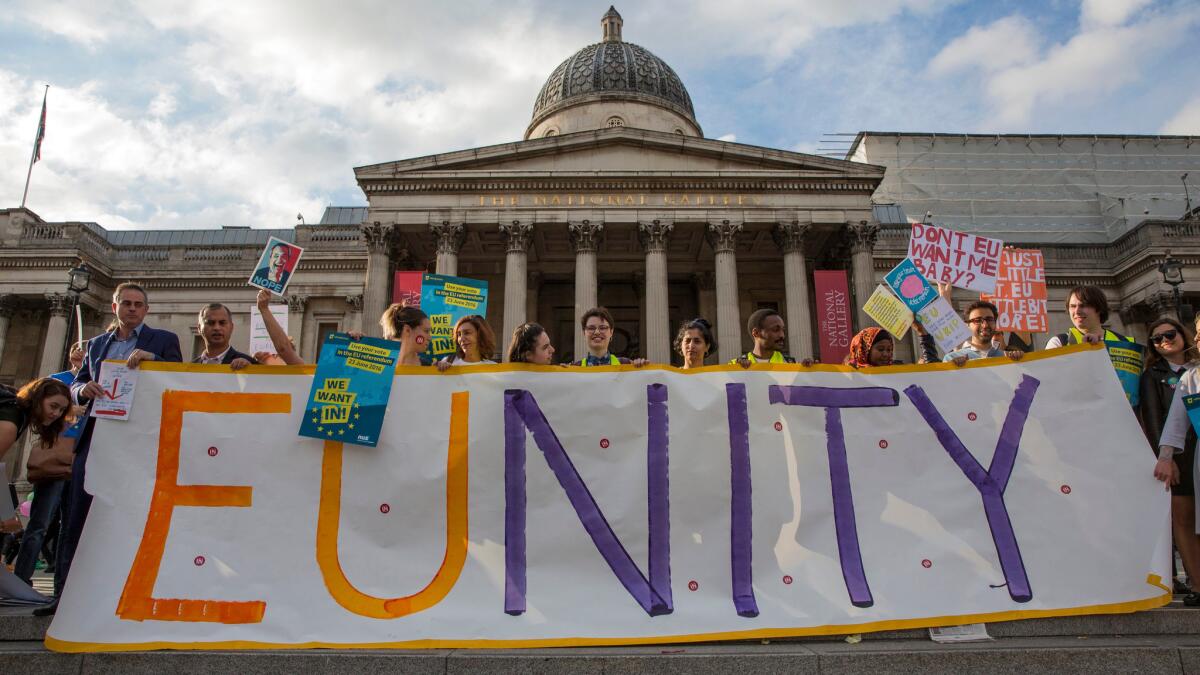Editorial: Brexit would be a disaster for Britain

- Share via
On Thursday, voters in the United Kingdom will decide whether to remain in the European Union. That the electorate is apparently so closely split between the options of “Leave” and “Remain” is ominous. At issue in this dramatic struggle over Britain’s identity, culture and independence is nothing less than the future of the 65-year move toward a closer, more integrated Europe.
On the merits, the Remain option — supported by Prime Minister David Cameron — should win overwhelmingly. Britain benefits enormously from its participation in the 28-member economic and political union, and the consequences of withdrawal could be catastrophic for the British economy — particularly for London’s role as an international financial center.
A recent study by the International Monetary Fund warned that the UK’s withdrawal from the EU could shrink the British economy by 5% by the year 2019. Nor would withdrawal affect only affluent Britons, as some Leave proponents have suggested. Researchers at the London School of Economics estimated that middle-class families in the UK would face the loss of at least 4% of their income if the UK left the EU and had to trade under the rules of the World Trade Organization.
Brexit also would complicate the UK’s economic relationship with the United States. U.S. companies would think twice about investing in the UK if it no longer enjoyed the trading advantages of being part of the EU. On a visit to the UK earlier this year, President Obama warned that if Britain were to leave the union, it would find itself at the “back of the queue” in trade negotiations with the United States.
Brexit would also make it harder for millions of Britons to travel freely and work on the Continent. Although supporters of withdrawal complain about an influx of workers from other European countries, the traffic is not only in one direction.
Finally, Brexit would increase political tensions within the UK. It was only two years ago that nearly 45% of voters in Scotland expressed a preference for seceding from the UK. Political leaders in Scotland, where support for the EU is strong, have warned that a withdrawal of the UK from the EU might increase the pressure for another independence referendum. In Northern Ireland, Brexit could undermine the Protestant-Catholic peace process by depriving Catholics in the North of a political connection they now enjoy with their co-religionists in the Irish Republic, an EU member that is not part of the UK. Cameron also has warned that a victory for the Leave campaign would lead to the return of border controls between Northern Ireland and the Republic.
The debate over Brexit has been distorted by the same fears of international terrorism (mixed with Islamophobia) that have resonated in other places in Europe.
Given these negative consequences, why is there so much support for Brexit? Some of the opposition is rooted in an island nation’s suspicion of the Continent that has been part of British political life for centuries and which helps to explain why, even as as a member of the EU, the UK has maintained its own currency rather than adopt the euro. A variation of that concern is the (highly exaggerated) fear that “Eurocrats” in Brussels, in their zeal to form an ever-closer union, are usurping decisions that properly belong to the British Parliament. That attitude is especially prevalent in Cameron’s Conservative Party, and some members of the prime minister’s government have broken openly with him to support Brexit.
Perhaps the most politically potent argument for Brexit is that the policy of free movement within the EU has allowed migrants from the Continent to take jobs away from British workers. It’s true that the UK is a magnet for workers from the continent, especially Eastern Europe. But studies suggest that those workers — who of course are also consumers of goods and services produced in the UK — haven’t dramatically affected the job prospects or wages of British workers.
Finally, the debate over Brexit has been distorted by the same fears of international terrorism (mixed with Islamophobia) that have resonated in other places in Europe and in the U.S. presidential campaign. Brexit supporters have warned that Turkey, a predominantly Muslim county, could be admitted to the EU in the near future — a claim Cameron has ridiculed. Britain has a veto power over the admission of new members (though Cameron hasn’t promised to exercise it to keep Turkey out), but the more important reality is that Turkey is far from meeting all of the requirements for admission.
Supporters of Brexit have argued that, once Britain withdrew from the EU, it could find other ways to establish favorable trade relations with the rest of Europe. They suggest, for example, that the UK could follow the example of Norway, a non-EU member that participates in what is called the European Economic Area. But a condition of membership in that arrangement is the same commitment to freedom of movement that supporters of Brexit object to as part of membership in the EU.
Cameron has rightly called Brexit a “leap in the dark,” and other opponents have noted that it threatens to destabilize the entire EU, giving other countries reason to reconsider their own membership in the institution. On Thursday, voters in the UK should refuse to take the plunge.
Follow the Opinion section on Twitter @latimesopinion and Facebook
A cure for the common opinion
Get thought-provoking perspectives with our weekly newsletter.
You may occasionally receive promotional content from the Los Angeles Times.






